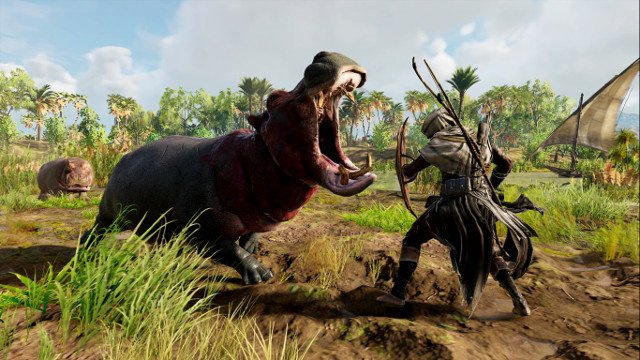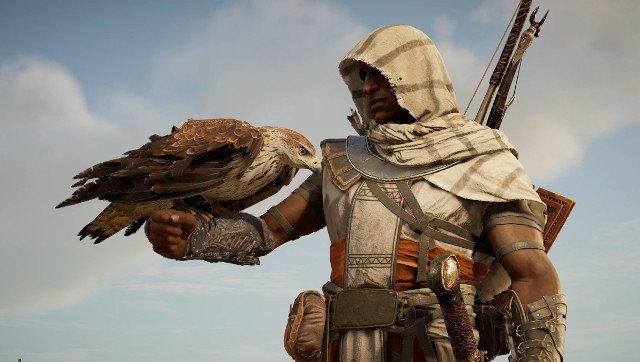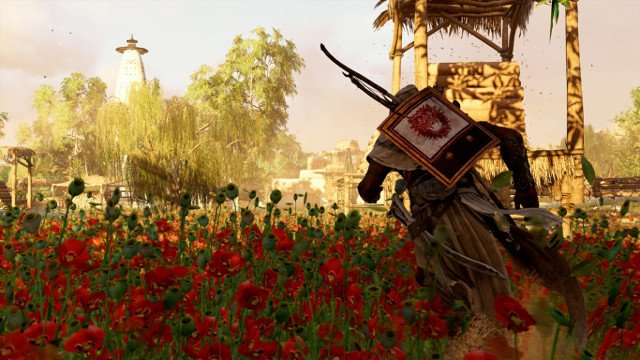Assassin’s Creed has had a continuous stream of ups, downs, and middling, well, middles. With that in mind, Assassin’s Creed Origins releasing just a month shy of the franchise’s ten-year anniversary isn’t just a coincidence. Like its name implies, the game shows the origins of the Brotherhood while also signalling a new beginning for the aging franchise. But Assassin’s Creed Origins isn’t just a new beginning; it’s also one of the best entries in the series.
Despite being an Assassin’s Creed game, its influences reach far beyond its predecessors. Origins openly embraces many of its contemporaries, mainly The Witcher, Metal Gear Solid V: The Phantom Pain, Dark Souls, and the last few Far Cry titles. While old Assassin’s Creed games would stubbornly stick to its dated concepts and spotty controls time and time again, Origins intelligently utilizes its inspirations to modernize and greatly improve itself while keeping its core DNA intact.
Stealth is one area that has seen a bevy of enhancements. Sneaking is much easier and user-friendly now because of the handful of nifty tricks it aped from Metal Gear Solid V. Ominous music plays when you’re near an enemy. Cloudy, white indicators fade onto the screen to subtly show the position of nearby guards. Time slows when you get caught, giving you a quick moment to avoid an alert. Borrowing the best, most intuitive elements from other sneaking games helps the series shed the cloud of uncertainty and frustration that has plagued the stealth in Assassin’s Creed since its inception.
Overhauled combat

But on top of adding helpful new systems, Origins has also smoothed out its existing ones. Marking targets from the sky via your feathered recon drone, Senu, is a meaningful and effective way to keep tabs on enemy placements. Aiming is also snappy and feels like a contemporary shooter instead of the clunky automatic and manual targeting the series was awkwardly married to. Crouching and dashing, as insignificant as they seem to bring it up, now actually feel like they should and work with you, not against you. This is an extension of the simplified climbing controls that, despite a small handful of annoying exceptions, finally listen and behave like a regular video game. These advancements should be a given and, to any other series, they would be. But finally seeing Assassin’s Creed ditch its anachronistic controls and become better because of it is worth mentioning.
Also: Everything You Need to Know Before Playing Assassin’s Creed Origins
Combat has not only been improved; it’s been completely overhauled. Fights are more deliberate and push the player to focus more on identifying threats and making decisions over waiting for the counter icon to pop up in order to insta-kill everyone. Parries are still important but they are only a part of your strategy and not the whole strategy itself. Blocking, positioning, and carefully-timed strikes are vital too since your new shield only blocks your front half and whiffed attacks leave you open to easy counterattacks. These defensive and offensive drawbacks give importance to your actions and the weighty, yet responsive controls give you the liberty to quickly make those decisions at a moment’s notice (aside from the few seemingly unavoidable attacks). Assessing your foes and knowing when to strike, counter, dodge, block, or run away gives the combat a consistently rewarding sense of depth from beginning to end.
The story, however, isn’t as engaging from beginning to end. Origins follows Bayek, an Ancient Egyptian Medjay (protector of the pharaoh), as he plots revenge against an unknown entity while simultaneously starting the Brotherhood of Assassins. However, it’s not as simple as that brief description might imply.
Origins shows the genesis of the Creed while also juggling a half-dozen other threads. It touches on keeping a marriage together, Egypt’s power struggle, starting the Brotherhood, a corrupt shadow organization, revenge, the Greeks and the Romans. Despite its wealth of topics, it’s never satisfyingly saying anything about any particular subject. It tries to focus on too many things — the literal antithesis of having a focus — and robs every individual arc of a payoff because it’s constantly interrupting itself with another different narrative element. The central revenge narrative suffers the most since each target barely gets enough face time for you to want to kill them as much as Bayek does. Fewer main plot points would tighten up the narrative and recycling those cut threads into side missions would give each concept the proper space to breathe and develop.
Open-world Egypt

Despite these drawbacks the plot is still entertaining, thanks to Bayek. He’s incredibly noble and determined but with the heart and respect that round out his character. While his aggressive bellows and deep, booming voice demand your attention, his tender moments were what stuck out the most. His interactions with his wife, Aya, were full of the type of marital love and passion we don’t usually see in video games and I would have loved to see more of a focus on their relationship. Bonding with his son was also a tragically underutilized highlight the game should have honed in on more often. He even apologizes as he loots tombs and small character moments like this define Bayek and make him a standout among the other assassins.
Bayek is a good, memorable character, but Egypt outshines him. Ancient Egypt is the best location in the series, checking off all the boxes for a good video game representation of a historical setting. It’s a huge, gorgeous collection of varied environments that hit all the familiar places from your history textbook while also letting you discover new, lesser-known wonders. Yes, the view from atop of the famous Great Pyramid of Giza is stunning, especially at sunset, but so is marveling at the dark, volcanic hills of the Black Desert and the crocodile-infested wetlands of Krokodilopolis. It’s stunning regardless of the time or place and it’s packed with of a ton of passable-to-decent side missions that give you a good enough excuse to explore every town, desert, and body of water.
Egypt’s openness extends to the mission design. Side and main objectives are cleverly designed to not allow for failure. Allies are essentially invincible during escort missions and there’s never an arbitrary timer or zone you’re forced into. This freeform approach puts the emphasis on experimentation and removes the restrictive training wheels that ironically poison other open world games. And outside of a few scripted sequences, you’re never locked into one mission. You’re free to wander away from most objectives and do whatever you please. I’d regularly get distracted by hijackable convoys or huntable animals on my way to my next mission. Oftentimes, I’d get so far removed from my initial quest and forget what I was originally doing. Non-binding missions and the freedom to get lost and do whatever you want is incredibly liberating and is an attitude more open-world games should embrace.
Sometimes, however, the game will ostensibly break its commitment to freedom and push you off the main path. Origins’ leveling system facilitates its expansive skill tree and gear system, but also serves as the means to artificially bar your progress. Quests have recommended levels attached to them and, while you technically can play those missions, you’ll run into absurdly high difficulty spikes if you’re underleveled. Regular guards will be extremely tough to kill and mini-bosses are almost invincible. You’ll probably find this out the hard way after a few deaths as you leave the mission area to grind experience elsewhere. While there is plenty of good side stuff to do, being forced to do them regularly to keep up feels out of place when considering the open philosophy surrounding the rest of the game.
Conclusion

A lot of this review is framed within the context of Assassin’s Creed as a whole and its shortcomings, in a lot of ways, it has to be. A series can’t go on for ten years, take a break, and then return with almost all of the same damn issues. The extra year of development time paid off and ensured that Assassin’s Creed Origins likely wouldn’t underwhelm its audience by repeating its past sins. Instead, it modernized itself by adopting a more open structure and intuitive set of controls and gameplay systems, effectively marking a new chapter in the franchise. It’s fitting that Origins showed the birth of the Assassin’s Creed while also indicating the much-needed rebirth of the Assassin’s Creed series.
Disclosure: GameRevolution attended an Assassin’s Creed Origins review event held by Ubisoft.
-
Combat and stealth mechanics are more responsive, complex, and involving
-
Egypt is a beautiful, varied setting
-
Open mission design doesn’t punish deviation or failure
-
Plenty of interesting stuff to do
-
Leveling system forces grinding and artificially makes the game more difficult
-
Story tries to juggle too many threads








